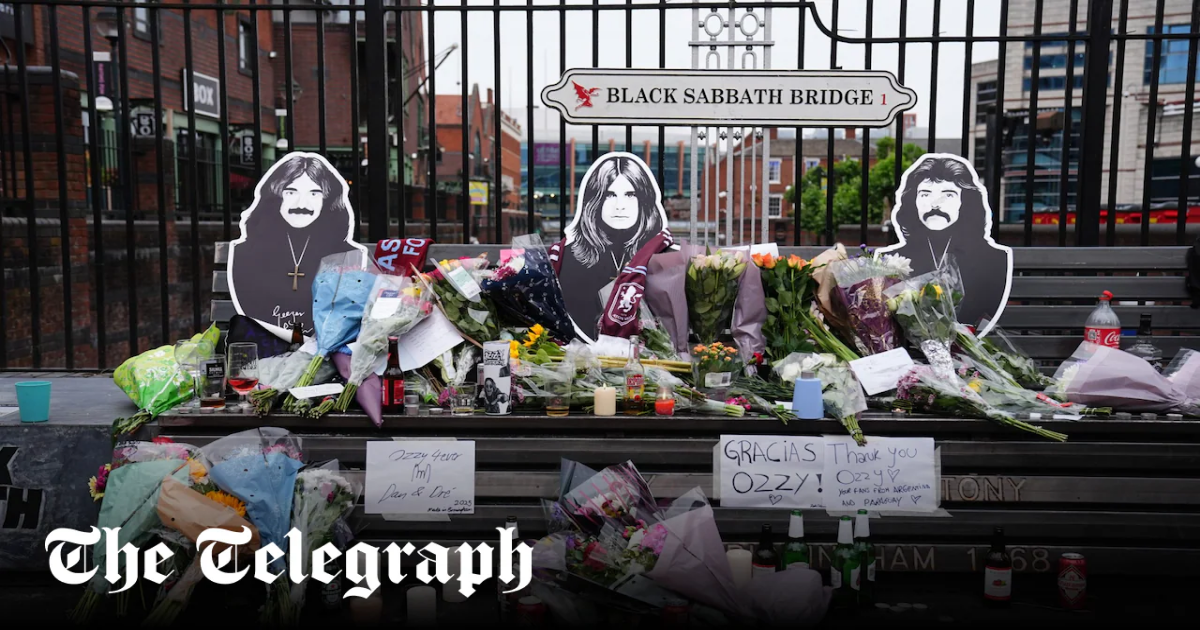Black Sabbath Bridge on Birmingham’s nightclub-packed Broad Street features a bench studded with the faces of the original line-up of the band that invented heavy metal.
The bridge, which arches over a canal, was covered by flowers on Tuesday night as mourners gathered to light candles in tribute to the Prince of Darkness.
From sheer force of will, and humble beginnings, Ozzy Osbourne transformed himself from Birmingham slaughterman to world famous rock god in Beverley Hills.
Every one of the original members of “Sabbath” was born in Aston but there is no one as iconic in the Second City as Ozzy, who died on Tuesday aged 76.
So it was fitting his image became the focal point of pilgrimage on the night Birmingham began to process the death of its most famous son.

“I felt compelled to do it,” said Phil Rolls, 51, from Kidderminster.
Gesturing towards the bench, where he had left a bottle of Jack Daniels in tribute to one of rock’s most infamous hellraisers, Mr Rolls said: “All four of them were innovators”.
“The Beatles invented almost everything else but Sabbath invented metal,” the record dealer added.
“Has anyone got a b—–d speaker?” yelled someone among the group of about 60 people.
There was no sign of the tributes slowing well into the night.
In the nearby Brasshouse Pub, they were doing a roaring trade in pints of Black Sabbath IPA.
It had to be a sign that the party-loving frontman died on the day the beer was discounted to just £3.45 because of a regular ale promotion.

Jack Ryland-Smith, a 34-year-old logistics driver, came to the city with his wife, whom he met while drumming for a metal band.
He said: “Ozzy Osbourne has got to have a statue somewhere in this city. Metal was born here.
“It’s a shame he wasn’t made a Sir, to be honest. Now he’s gone, but I think he deserves the title, for what he has done. Not just for the city, for Birmingham, for Aston … but for the world.”
Just two weeks ago, there were very different and happier scenes at Black Sabbath Bridge.
Rather than the hushed semi-circle of fans, some of whom were in tears, there was a party atmosphere.
Long queues of people from as far afield as Argentina and the Philippines queued patiently to have their photographs taken with the image of Osbourne.
Their hero had reunited with the original Sabbath line-up for the first time in 20 years for a farewell concert at Villa Park.
Despite suffering from Parkinson’s, Osbourne, seated in a satanic throne and too weak to stand, managed a triumphant homecoming performance for an adoring crowd.
At that final concert, the Prince of Darkness had raged against the dying of the light.

The feat of endurance was at times an almost unbearably poignant swansong – even more so now.
“He wasn’t in great nick,” said Mr Rolls in the evening dark, “but he was determined to make the thing happen”.
Many reflecting on Black Sabbath Bridge believed Ozzy had only allowed himself to die after the concert, which was a huge morale boost for a city disheartened by its ongoing bin strike.
“He waited. At the end, he said, ‘That’s me done,’ and he was done,” said Amy Sanders, 31, “Rock will never be the same again.”
Mark White, 62, was in his pyjamas in Lichfield looking forward to the England match in the women’s European football championship when he heard the news.
A Sabbath fan of more than 50 years, he got in his car and came to the bridge.
He saw the band play ten times, including an earlier farewell gig which he went to with his mother, who was then in her late seventies.

Like many at the vigil, he had watched the stream of the Villa Park gig and regretted not getting a ticket.
He came to the city before the concert, where Sabbath performed nine songs at the end of a day packed with metal’s biggest stars paying tribute to their influence, including Guns N’ Roses, Metallica and Aerosmith.
“People had come to Birmingham from all over the world to celebrate. There was such a great feeling on the streets. It was stunning. People from Argentina, America, Canada,” Mr White said.
He gestured to the bench on the bridge. “This is a monument now.”
Stuart Brace, 59, and his wife Marie, 51, were both at the farewell gig, which was called Back to the Beginning.
Both have been fans of Sabbath since the 1970s, after hearing their siblings listen to their records.

The couple drove to Birmingham from Oldbury, a market town in the Black Country, after the news broke of Osbourne’s death.
“I was in shock when I heard,” Marie said. “We knew he was ill, but not that bad.”
They brought their son Noah, 20, with them to the vigil. All three members of the family were wearing Sabbath T-shirts.
Stuart thinks Noah heard his first Sabbath song when “he was about two”.
“I grew up listening to them,” Noah, who is in a band, told The Telegraph. “I play guitar and Iron Man was the first song I ever learnt.”
At Birmingham Museum and Art Gallery in the city centre, there is a world-first exhibition dedicated to the Brummie icon, called Ozzy Osborne: Working Class Hero.
Close to the town hall, there is a large installation of the covers of Sabbath’s most influential albums erected for the Villa Park gig. Near the city’s main train station, The Crown pub, where the band played their first gig, displays huge photos of Sabbath on its frontage.
Later this year, Black Sabbath – the Ballet, will be staged by Carlos Acosta’s Birmingham Royal Ballet in the city.
Ozzy may be gone, but his legacy, like the candles flickering before his image on Black Sabbath Bridge, burns bright.
